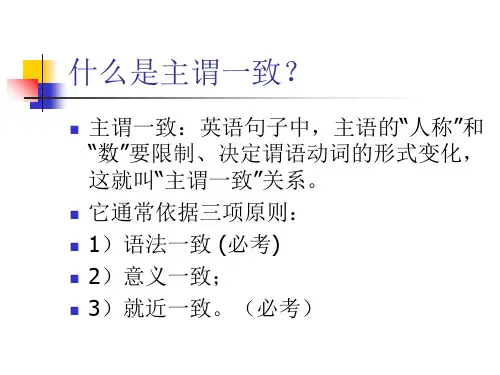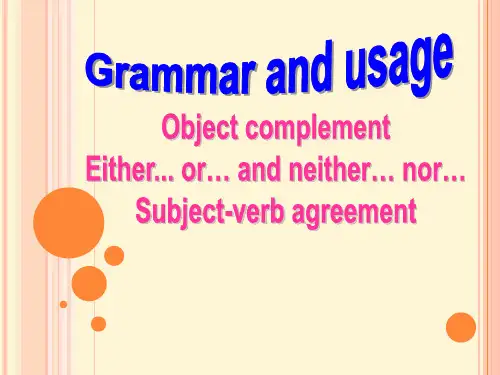Class Four is on the third floor. Class Four are unable to agree upon a monitor. 6、如果集体名词指的是整个集体,它的谓语动词 用单数;如果它指集体的成员,其谓语动词就用 复数形式。这些词有family, class, crowd, committee, population, audience等。 注意:people, police, cattle等名词一般都用作 复数。 如:The police are looking for the lost child.
What I bought were three English books. What I say and do is (are) helpful to you.
注意:由what引导的主语从句,后面的谓语动词 多数情况用单数形式,但若表语是复数或what从 句是一个带有复数意义的并列结构时,主句的 谓语动词用复数形式。
He is one of my friends who are working hard. He is the only one of my friends who isworking hard.
5、在定语从句时,关系代词that, who, which 等作主语时,其谓语动词的数应与句中先行词 的数一致。
8、在倒装句中,谓语动词的数应与其后的主语 一致。There comes the bus. On the wall are many pictures. Such is the result. Such are the facts. (二)逻辑意义一致原则:逻辑意义一致就是谓 语动词的数必须和主语的意义一致(因有时主语 形式为单数,但意义为复数;有时形式为复数, 但意义为单数)。1、what, who, which, any, more, all等代词可以是单数,也可是复数,主要 靠意思来决定。如:Which is your bag? / Which are your bags? / All is going well. / All have ⑴Mr Green, together with his wife and children, has come to China. ⑵Nobody but Jim and Mike was on the playground. ⑶She, like you and Tom, is very tall.










